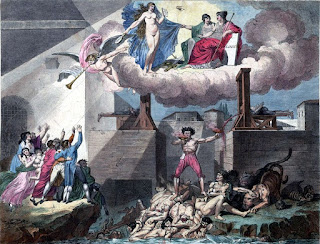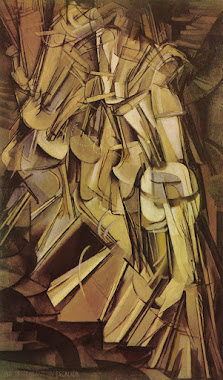How Should We Then Live? Chapter 6: The Enlightenment
Human Reason's Dead End
Enlightenment Vs. Reformation
This chapter focuses on the era known as the Enlightenment and the political revolutions which were influenced by the thinking it produced. These revolutions are contrasted with others that were influenced by the thinking of the Reformation. To be sure there is overlap. Nothing in history is as simple as A caused B. However, Schaeffer is correct to categorize them based on what the strongest influence was for each and how that explains the grossly different outcomes.
The Enlightenment occurred in roughly the 17th and 18th Centuries. It couldn't have happened without the Reformation but its approach to truth was diametrically opposed. The Reformation led to the Scientific Revolution. At a high level, the Enlightenment came out of the Renaissance and Scientific Revolution.
The ideals of the Enlightenment were science, reason, humanism, and secularism. It was named by those who participated in it. They saw themselves as bringing humanity out of the darkness of religious dogma and faith in God. Their two hated enemies were the Catholic Church and monarchy. Political liberalism came out of this era, but as we can see in this chapter, the outcome of liberalism took two different shapes. One type was still based on biblical principle. The other was totally cut loose from it.
Schaeffer described how the Reformation brought biblical principles into politics and the resulting changes toward individual freedom and limited government in chapter 5. The Glorious Revolution and the American Revolution are his examples. He uses the French and Russian Revolutions as the Enlightenment examples.
Glorious Revolution Vs. French Revolution
The Glorious Revolution occurred in 1688 in England. It was also called the Bloodless Revolution. William III of Orange and Mary became rulers together in a peaceful process, though there was violence in civil wars that occurred earlier. It was more or less peaceful because the Parliament asserted its authority as coequal and constrained the monarchy through a set of laws.
Learning about this political set up while exiled there (1726-1729), the French philosopher Voltaire (1694-1778) wanted to repeat the same thing in his home country. He wrote glowingly of the freedoms England was enjoying as a result.
"The English are the only people upon earth who have been able to prescribe
limits to the power of Kings by resisting them, and who, by a series of
struggles, have at last established... that wise government where the prince
is all powerful to do good, and at the same time is restrained from
committing evil... and where the people share in the government without
confusion."
Voltaire's wish came true. He wasn't alive to see it, but the spirit of the French Revolution came from his writings. Too bad he didn't base his thoughts on Sola Scriptura. Instead he built them on a foundation of humanism and logic. The political change brought great blood shed. The political order built on sand soon crumbled. In the chaos, the people cried out for order in the form of Napoleon Bonaparte. There was no Parliament to limit his power. He was Emperor of France and soon waged war to spread his Empire over much of Europe.
How did "Voltaire's revolution" differ so much from the relatively bloodless Revolution in England? After all, the Enlightenment ideals that Voltaire supported were reason, nature, happiness, progress, and liberty. Who can argue that those aren't good things? The aim was to bring Utopia, paradise on earth. But all those things were stripped of any objective meaning or defined outside of normal human experience. Everything was to start with mankind and his ability to think. The humanism of the Renaissance hit full force in the Enlightenment.
The Enlightenment and the Reformation were the very opposite of one another and they produced results which were opposite in nature as we can see with this example. Unlike the Reformation belief in the total depravity of man, the Enlightenment thinkers believed that mankind was morally good (at worst neutral) and could be perfected. This belief led to an era in France after the revolution called the Reign of Terror. The revolution didn't bring Utopia, so the leaders in their fervor thought the real problem was that some disagreed. They thought Utopia would come if they killed enough dissenters and put the right people into power. Even after this proved false their philosophers, like Marquis de Condorcet, kept believing in the faith, even while being hunted down by the secret police.
"We have witnessed the development of a new doctrine which is to deliver
the final blow to the already tottering structure of prejudice. It is the idea of
the limitless perfectibility of man."
The only deity these men allowed for was one who was silent and uninvolved in the world. That was good because they preferred God stay quiet while they were busy making the world a better place. The only time Voltaire wanted to speak with the Christian God was to call Him to account and prove His guilt after the Lisbon earthquake in 1755. Voltaire used this tragedy as justification for removing all faith in God from life and thought. The spirit of the age became decidedly atheist from this point on. Political and intellectual elites today still follow in this tradition. If any religion was allowed it was paganism. Voltaire himself venerated a painting of the Greek goddess Diana in his home.
Back to the French Revolution. In its initial phase it was liberal and bourgeois and started well enough. The National Assembly wrote the Declaration of the Rights of Man on August 26, 1789 based on a secular humanist theory. One telling sign of this is that for them "the Supreme Being" is "the sovereignty of the nation". Following Rousseau's general will theory they made plans for the nation based on what they believed was the unified preference of everyone. It is an unworkable idea, and devolves into arbitrary commands from the state and death to those who disagree.
Two years later they drafted a constitution, which was promptly abandoned starting a Second French Revolution. But still they trudged forward with secularism creating a goddess of Reason as a substitute for God. An actress played the role and was carried into the Notre Dame cathedral by men dressed as Romans showing again how the Enlightenment followed the re-emergent paganism of the Renaissance. It ended shortly with a massacre. In September 1792, 1300 prisoners were killed. The new government ended up killing 40,000 total including revolutionary leader Maximillian Robespierre (1758-1794). Their attempt to build society using human intelligence as a foundation led to chaos. Order was only restored by the rise of a dictator.
The Russian Revolution
Clear parallels are found between the French and Russian revolutions. First, they were based on secular humanism and high minded ideals. They both set out to turn humanity into something better through logic or science. Second, they claimed they would produce greater freedoms for the average person. In February 1917 after overthrowing Czar Nicholas II, a liberal reformer Aleksandr Kerensky (1881-1970) came to power in the new provisional government. His direction could have led to a better Russia. Third, the revolution turned to blood shed and repression. The Bolsheviks took over the provisional government in October 1917 through a coup. They were literally the minority Communist party in the Russian assembly. The assembly at first was made up of multiple democratic and communist parties. They promised to hand power over to the working class and increase material prosperity as a result. Aleksandr Solzhenitsyn explains what actually happened.
"I repeat, this was March 1918- only four months after the October Revolution
- all the representatives of the Petrograd factories were cursing the
Communists, who had deceived them in all their promises. What is more
not only had they abandoned Petrograd to cold and hunger, themselves
having fled from Petrograd to Moscow, but had given orders to machine
gun the crowds of workers in the courtyards of the factories who were
demanding the election of independent factory committees."
Absolute Truth
According to the biblical worldview there are absolute truths. In a society influenced by the Reformation common people could confidently judge between good and evil, justice and injustice. Christians didn't always do this consistently but the foundation was there to support those who had the courage and motivation to speak out. The biblical worldview also explains the created order of nature, so that people know what things in the world are worth protecting and what came from the abnormalities of sin.
Starting with human reason alone, no such distinctions can be made. In his Manifesto of the Communist Party, Karl Marx asserts that marriage was a part of capitalism and so should be discouraged. In order to avoid chaos, the Russian state later had to create a code of laws to control families. Arbitrary rules worked better than dissolving the nuclear family. Yet, there was no real base to decide what was right or wrong.
"A Christian can fight the abnormality which has resulted from man's
rebellion against God without fighting the final reality of what is- that is,
without fighting God. Therefore, because God exists and there are
absolutes, justice can be seen as absolutely good and not as just expedient."
As the Enlightenment has shown us, human reason by itself can't discover the best path for society. The Bible gives us guard rails for logic and the base assumptions needed for proper reasoning. So, if the Bible doesn't just explain who God is, but also how life on earth should proceed, how should we then live?





This is a good summary, also extending it into the Russian Revolution.
ReplyDeleteYou might find this of interest; it parallels some of your thoughts, extends some further, others not as far:
https://mises.org/wire/cost-enlightenment